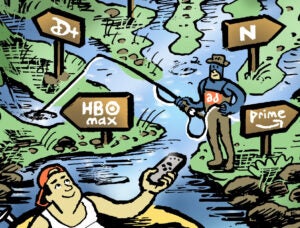“Data-Driven Thinking” is written by members of the media community and contains fresh ideas on the digital revolution in media.
Today’s column is written by Chris Martellotti, co-founder at Wholetone Media.
In recent months, the data management platform (DMP) has taken center stage as both publishers and marketers look to propel their organizations forward.
Part of the value of a DMP is the software and ability to understand audiences, therefore increasing the value of media execution for buyers and sellers. Yet, in many cases, companies are experimenting with DMPs because they simply don’t have data expertise in the room, so they bring in support from a DMP vendor to help their organization. But is this working?
Simply buying a DMP is not something that should be on a company’s to-do list without a larger data strategy. In the same way that some organizations hopped on the programmatic bandwagon, buying media from demand-side platforms (DSPs) or setting up contracts with supply-side platforms (SSPs), the “get-in-the-game” strategy misses the fundamental value of the change taking place in the market.
For publishers, monetization has shifted to a game of free-market economics rather than pure salesmanship and positioning. As audiences are sliced into individual, real-time, user- and impression-level opportunities, a publisher must understand the supply and demand for their inventory segments to maximize value. The unbundling of one’s audience via programmatic’s sell-side tools is something that scared most sellers.
The reality is that sellers must understand how a buyer is thinking in order to maximize revenue. Here is a hint: Buyers are less interested in reach and more interested in frequency, engagement and user profiles. Media has become the buying and selling of attention, not impressions, and capturing a visitor’s attention is the currency publishers must understand deeply.
For marketers, programmatic media puts their organizations in the driver seat. The buying tools, if used properly, can drive massive efficiencies for their businesses. It is very likely that they will buy media against fewer actual people than ever before, but engaging with those users in a deeper fashion will have a larger impact on their end goals.
Rather than a traditional media buy – which, for simplicity’s sake, I will say has two parts: the “big idea” and the execution – marketers can now test thousands of big ideas at a time, create unique storylines for different customer groups and make quick adjustments to their business because the execution provides immediate feedback on how the market is responding.
Never before has the coordination between the creative and analytical brains within an organization been more important, and ensuring these groups are able to talk the same language is crucial. In programmatic, media is data.
Any form of digital advertising has the ability to be bought, sold and measured in real time. Some organizations are leading the charge with this opportunity. If the success of a business could be measured by one metric, what is it? How are different teams measuring the impact of their actions against that metric?
A DMP can help once that fundamental question is answered. The challenge seen by many early DMP adopters is that audience information is very valuable but seldom shared across the organization, and a centralized data strategy is not understood or championed at the executive level. This is starting to change as executive leaders realize they are all in the same business: the data business.
Data will change business to the same extent that computers changed business. This isn’t because there is so much more data than there was in the past or because we now have software tools to capture it, but rather because data allows all businesses to be nimble, iterate quickly and leapfrog their competition with a mathematical and analytical edge.
Capturing, measuring, organizing and segmenting data is what will separate winners from losers in the future. A DMP is only as powerful as the strategy behind it.
Follow AdExchanger (@adexchanger) on Twitter.














